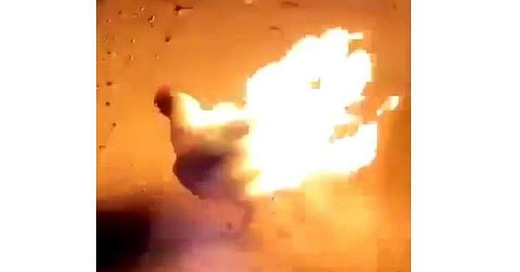“No Injuries Were Reported” in Fire That Caused 100,000 Deaths
Our absurd disregard for animals
Recently, a fire killed around 100,000 chickens—burned them to a crisp. Taylor Hartz notes
about 100,000 chickens may have died in the blaze, according to multiple media reports.
However, despite the fact that it burned to death 100,000 beings, she made sure to clarify that “No injuries were reported in the fire.” Apparently being burned to death is not an injury.
Cailyn Blonstein also reports on the 100,000 beings that were exterminated in a fire. “Approximately 100,000 Hens Killed in Fire” is the article title. However, not to worry, she notes that “no injuries were reported.” Once again, we see a rather curious trend—when one burns to death, that’s not an injury. At least, not if they’re feathered.
But the article focuses on the real issues, the real things people care about, noting, “the anticipated impact on egg prices from this incident is minimal to none at this time.”
This is, of course, not the first time that hundreds of thousands have been burned to death by a fire that somehow injures no one. This article, describing 200,000 chickens burning to death, quotes an industry spokesperson noting “no one was injured.” This is the least inaccurate of the statements. The claim that no injuries were reported is totally absurd—one who burns to death in a fire is consequently injured. But no one was injured—for from the industry’s—and also the media’s—perspective, the chickens that burn to death are no one. Nameless, faceless creatures, whose tortured agony as fire burns their skin doesn’t matter—the only tragedy is that it makes them too crispy to serve.
Stewart et al report on the horrors of the chickens being burned to death—a hundred thousand of them. By report, I mean they mention in one sentence that someone is sad about it.
“When I heard about the chickens, I was really upset,” Crystal Kyllo said. “That’s a lot of chickens.”
Cowen worries about the impact that this might have on the prices of eggs. The title of the article is “100,000 Chickens Estimated to Have Died in Connecticut Fire Amid Ongoing Egg Price Concerns.” Apparently, whenever a horrific tragedy occurs, where hundreds of thousands burn to death, our first concern must be about the impact it will have on the industry.
This type of reporting would be unspeakable if it came to puppies. If a fire burned to death 100,000 cute puppies, people’s first thought wouldn’t be to question the impact it has on the puppy torture trade, before declaring that there were no injuries. People would worry about what happened to the puppies who burned to death.
In 2019 there was a story of three teen boys setting a chicken on fire. This is what that looked like.
Of course, the broadcast didn’t show the video, it’s far too disturbing to actually watch or show. I couldn’t find a video of it, because no serious news source will post a link to it—just as they wouldn’t post a link to child porn or a video of serial killers murdering their victims.
If, on a small scale, you set a chicken on fire, you’re a criminal, you’ll go to jail—as these boys did—and you’ll be universally condemned. But when these chickens are in factory farms, hundreds of thousands of them can burn to death and no one gives a shit. The half a million or so birds that burn to death on average per year are totally ignored. In 2022, it was half a million birds that burned. In 2021, it was nearly 700,000.
This wasn’t a big story. It’s never a big story when animals are tortured in factory farms. The coverage of this, and utter disregard for the lives of the animals is utterly despicable—a hideous blot on the morality of our society. Our neglect for chickens is so extreme, so complete, that we don’t even notice it. Reporters are willing to report that no one was injured by something that killed 100,000 birds, because they ignore that birds, like the rest of us can be injured.
Hannah Arendt was right to talk about the banality of evil. The evil of the factory farm—the vilest institution in history—comes not from some grand show of hatred, but from mere incentives—incentives to make profit. The evil comes from our deeply engrained attitudes—not of hatred, but of indifference.
The evil comes from our appalling disregard for the apparently uninjurable birds—who burn to death by the hundreds of thousands for the sake of nice tasting food.





